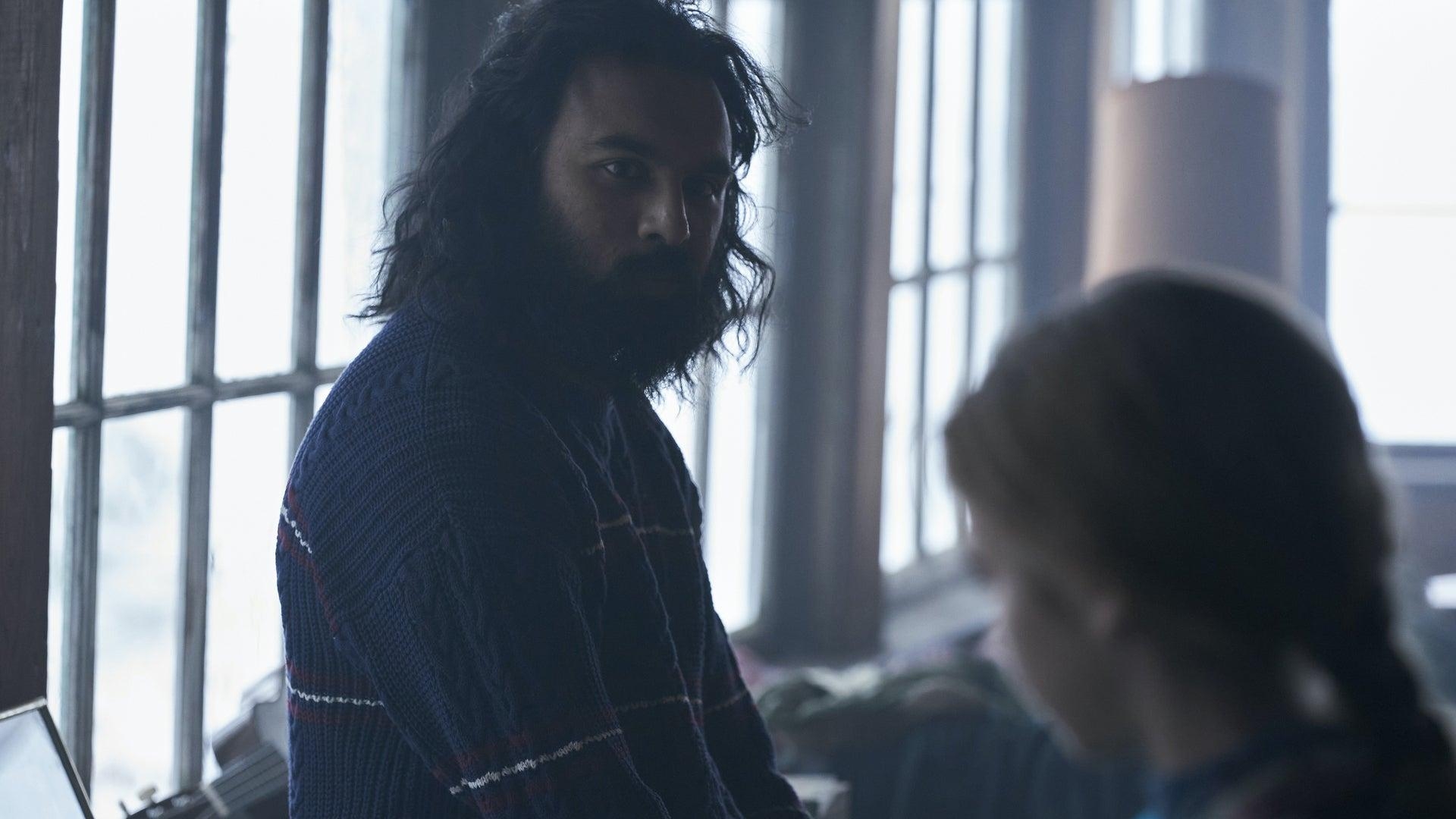Station Eleven plays with comedy and tragedy this week
Clark's and Jeevan's stories stand in stark contrast with one another in the eighth and ninth episodes of the season


For weeks, I’ve been wondering how Station Eleven was going to work as a show. Reading the book has been both a blessing and a curse. I read Station Eleven before the pandemic but after Trump became president, and I found it comforting during that seemingly apocalyptic event. It has the kind of optimism I’ve found to be anathema in most TV dramas, which favor nihilism, cynicism, and an anti-hero complex that I haven’t enjoyed since 2016. Even Patrick Somerville being showrunner didn’t give me much hope—I also read The Leftovers before I saw the show, and I couldn’t stand the latter. Not because it wasn’t good (I didn’t watch far enough to have an actual opinion), but because I couldn’t stomach the despair or gray morality of the characters when I had to spend more time with them outside of Tom Perrotta’s text.
But with this week’s episodes, “Who’s There?” and “Dr. Chaudhary,” the show has both met and exceeded my expectations. Adaptations are tricky things—the best ones become more than the sum of their parts, but usually fall into the trap of merely summarizing the story. When I wrote about Gael García Bernal not fitting the character Arthur Leander in episode three, it was because I was expecting the show to go the way of the book. But, like casting Captain America Chris Evans in Snowpiercer and Knives Out, the show works to subvert our expectations while staying true to the book.
I read the book on Kindle, so I had the advantage of seeing what people had highlighted in their copies. In the book, Clark has the same job—doing assessments of CEOs. But the book includes a flashback to when he went on one particular interview that stopped him in his tracks. Dahlia, who he’s meant to speak to about a CEO, tells him that said CEO is a joyless bastard. “Adulthood is full of ghosts,” she says.
“I’m talking about those people who’ve ended up in one life instead of another and they are just so disappointed. Do you know what I mean? They’ve done what’s expected of them. They want to do something different but it’s impossible now, there’s a mortgage, kids, whatever, they’re trapped. Dan’s like that.”
“You don’t think he likes his job, then.”
“Correct,” she said, “but I don’t think he even realizes it. You probably encounter people like him all the time. High-functioning sleepwalkers, essentially.”
What was it in this statement that made Clark want to weep?
Was it the show that had me on Clark’s side, or this particular sequence? In the book, published in 2014, Clark is a distinct figure because he’s gay, outside the heterosexual mores of Miranda and Arthur’s relationship. But in the show, he’s something darker. As one of the only white adult characters from pre-pandemic times, he’s showed as having money, status, romantic success, and so on, but he’s still bitter about Arthur’s success. Arthur, in turn, is a friend who actually likes Clark, and is shocked at his misplaced anger. And it turns out his relationship with Miranda was a lot more troubled and full of misunderstanding than Clark, Tyler, Elizabeth, and even Miranda understood.
The subtle way this episode clears a lot of my confusion about the rest of the show is masterful. While in the book, the above conversation grants Clark a release from himself before the pandemic, in the show, Clark still does not seem to have learned this lesson. Clark is the figure to be wary of here. He acts like Arthur is the source of all his anger, his problems, his bitterness, and he acts like Tyler is yet another Arthur he so personally dislikes. The museum is less a source of safety and kindness and more a way for Clark to rule with an iron fist and hang on to his sleepwalking life with an even stronger grip.
Another thing the book doesn’t have is Elizabeth. Knowing that she wasn’t sleeping with Arthur before Miranda burned down the guesthouse explains more of her character, and even more of how she and Arthur struggled to find understanding. She, like Clark, was unaware in the old world, but in the post-pandemic times, she is much more understanding. I can understand why she holds Tyler at the end of the first episode and says, in an almost childlike way, “He came back.”
Beyond Clark, “Who’s There?” doesn’t completely work—I absolutely do not understand how Kirsten went from being so wary of Tyler that she stabbed him for freaking her out, to listening to him. The main problem is the way that Tyler terrorizes the Traveling Symphony is enough for Kirsten to not like him. Or did I mistake that sequence where he uses a child as a suicide bomber? Maybe it’s because she doesn’t trust the museum and some of the Tyler’s frustrations with Clark are legitimate? Not all of them are. Maybe it’s because he’s the only other person who’s read Station Eleven. Even Kirsten has a weakness.
Ah, and then we get to my favorite, favorite episode of this series, and the one I’ve patiently been waiting for: “Dr. Chaudhary.” In the book, Jeevan is important in the beginning and a footnote in the ending; but the structure of the show lets Jeevan be his own, totally new character. He’s a coward, plain and simple, not unlike Dev Patel’s character in The Green Knight. While both Patels—Himesh and Dev—have luxurious hair and British Indian origins, it’s the fidgety, awkward, and ultimately, really funny way they shrink back from responsibility that really gets me.
Jeevan’s episode is by far the funniest and perhaps even the most relatable sequence of the show. He’s bogged down by the responsibility of Kirsten, protesting that he needs other adults and she needs other kids and he can’t stay in the cabin all winter. He hates the book she’s found solace in, throwing it away in one scene. He hates how much she better related to Frank and how much they both so obviously miss him. Most of all, he hates that he has to be strong for Kirsten yet he actually can’t be strong for Kirsten.
In “Who’s There?,” when Clark meets Kirsten in the before times of the play, Arthur tells him that Kirsten apparently has a bad home life. There’s an implication that Kirsten had survival instincts long before the pandemic, although why and how we may never know. But certainly it’s in strong contrast with Jeevan’s wishy-washy awkwardness. He even lies over the radio about being alone and being a doctor, which is what ends up separating him and Kirsten, but also what helps him grow the fuck up.
Even the little tribe that Jeevan finds is hilarious. Of course Kirsten knows his old pre-pandemic nickname, “Leavin’ Jeevan.” Of course he falls in with a bunch of would-be moms in a Y: The Last Man–type sequence (Brian K. Vaughn did say that the comic was about Yorick learning he had to grow up from the strong women around him). If there’s anything that can get a man to grow up, I guess it would be seeing several live births over the course of a day or two. I knew, I knew, that the pregnant lady he fights off was going to end up being his partner. Somehow, every part of Jeevan’s experience with the pandemic is comedy over tragedy, through a combination of dumb luck and almost over-the-top sincerity.
Pairing Jeevan’s episode with Clark’s is great: While Clark is barely holding it together, ready to go on a bender from even the smallest perceived slight from Arthur, his emotions packed inside him like sardines in a tin can, Jeevan is constantly spilling his emotions everywhere. The main problem is he can’t lie, and if he tries to lie—like when he initially shrugs off Kirsten’s protest that he got rid of the book—he’s too obvious about it.
But it’s the moment he does lie, when he understands suppressing his emotions in order to hold someone else’s, that he finally blooms. It’s when he’s helping a doctor help a girl give birth, and things are not looking good. He’s there for her till the end, finally showing up instead of shrinking back. The baby doesn’t survive, and it’s Tyler who shows up as the “Dave” the now deceased mother was looking for. He doesn’t get to keep the baby, but he does give you a chill down your spine as you get to see exactly how intertwined the characters are.
From there, every moment of his happiness feels earned. He earns the home he makes in the cabin with his partner, his three adorable children, his actual work as a doctor. He’s off to make a housecall. Hm, I wonder if there was a character who’s in a hospital bed who needs some assistance….
Stray Observations:
- Thanks, HBO Max, for that flashback to my 8th grade health class.
- Was Frank the apparition the result of all the weed and meds and alcohol Jeevan had?
- On that note, another way Jeevan is highly relatable is how badly he wants to escape his circumstances. If it’s not his drugs, he wants to watch a movie. He refuses to read Kirsten’s book.
- Frank’s fatherly sequences in his episode stand out more now that we know how bad Jeevan is at it on his own.
- I love how this show lets memorable scenes leak into the character’s present. The part when Jeevan plays the keyboard’s song of a dead father’s dead child nearly broke me. And of course it calls back to this sequence in Frank’s episode, where he remixed a celebrity interview into A Tribe Called Quest’s “Excursions.”
- So, if there’s an apocalypse, I should make my way to a baby store. Seems like the safest place on this whole show.